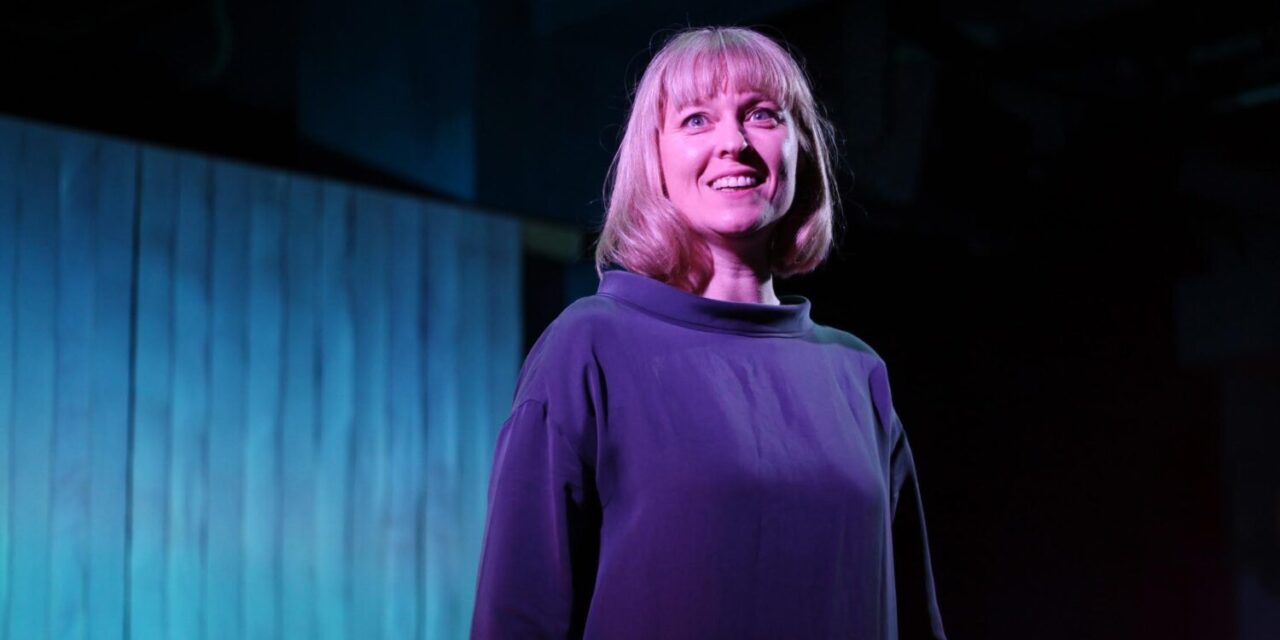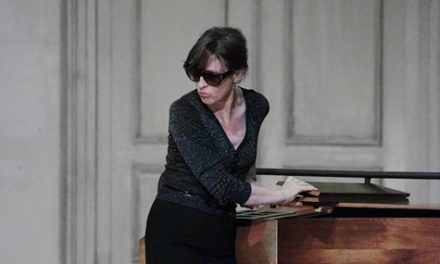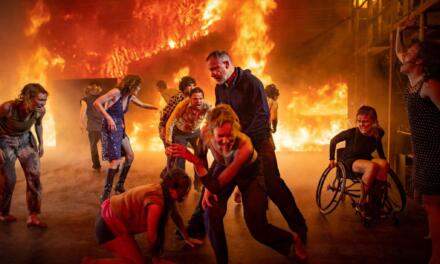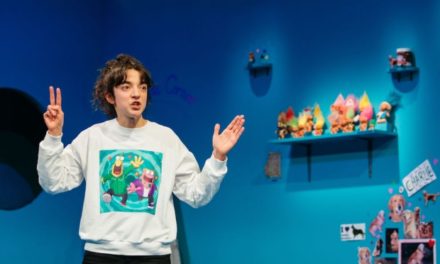Natasha Sutton-Williams interviews Sophie Woolley about her play Augmented – a personal story about the joy, and conflict, of becoming ‘hearing’ again after 22 years of progressive deafness. Commissioned in development by Unlimited and produced in association with Told by an Idiot the play is directed by Rachel Bagshaw and tours the UK from 5 March – 25 March 2020.
You might describe Sophie Woolley as a Pokémon: she keeps on evolving. Woolley started her career as a performance artist and spoken word artist, then began writing satire and performing in nightclubs, transitioning into writing and performing radio plays for the BBC. Interestingly, she was at the forefront of climate crisis awareness, having written about climate activists for radio in 2010. After being spotted in her play Fight Face at the Lyric Hammersmith, she starred in Channel 4’s Cast Offs. She’s been a writer on attachment at Soho Theatre, written for Casualty, and won places on the Channel 4 screenwriting course and the BBC Writers’ Access Group. She also created her own satirical series Deaf Faker on YouTube.
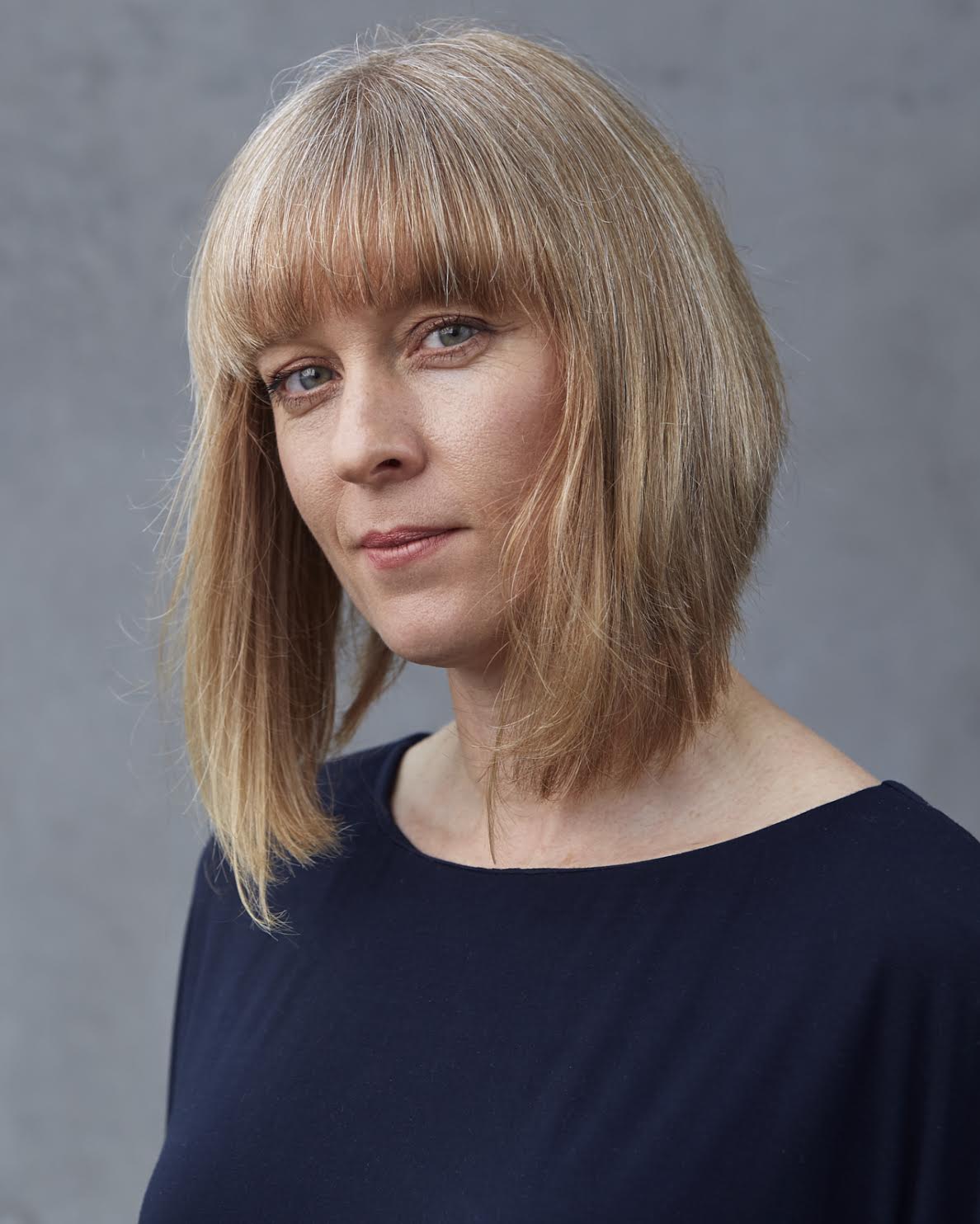
Sophie Woolley. Photo credit Justin Munitz.
Is there anything this woman can’t do? With her new solo show Augmented touring the UK this March, it seems unlikely. The show is based on her personal experiences of going deaf over twenty years from the age of 18 to 39, when she had a cochlear implant inserted. The narrative depicts her illuminating but often conflicted journey of being reintroduced to the hearing community and how this has impacted her closest relationships. “In 2013 I had the cochlear implant. It changed my life and the way I engaged with culture. I’ve been hearing, deaf and now I’m what I call a deaf cyborg,” says Woolley. “Having a cochlear implant didn’t just change my life, it made me see culture differently.”
There were no theatre shows that reflected Woolley’s unique experience of the world, so she decided to make one.
“To share the joy and fear of becoming a cyborg. Augmented has the feel of a Sci-Fi show. It’s about power, transformation, the complexity of identity in terms of acquired deafness and the ‘reversal’ of that. It’s about what biomedical intervention means for the future of humanity. It’s also moving and funny. I start the show trying to deliver a talk about the glistening future of us all becoming cyborgs. My mum’s minicom (a life changing 1980s text-phone for deaf people) calls me back from the past. Cyborg Sophie can’t tell the story of becoming a cyborg without a time machine travelling through her (my) past. I land in past moments and re-enact them. Often they are significant experiences but re-enacting them comes at a cost. I play both my mum and husband in the show. I speak in English and there are a few lines in Sign Supported English. The sound design, composition, set and captions help tell the story. It’s also audio described and relaxed.”
The genesis of Augmented has been a long process. After initially workshopping material with director Gemma Fairlie (an eminent educational practitioner and Artistic Director of Light the Fuse) and dramaturg Sarah Dickenson, Woolley self-directed scratches of Augmented in 2017 at Poplar Union and Battersea Arts Centre. The dance and musical elements of the show were then developed during an R&D at Sheffield Theatres via Ramps on the Moon in 2018.
Woolley had another three R&Ds in 2018, supported by Poplar Union, Ovalhouse and New Wolsey Theatre. With support from Unlimited, the Bush Theatre provided space for a design R&D where Woolley and her team developed the creative access for the piece, honing in on captions and audio description.
Woolley wrote the Augmented script over two years (2017-2019), collaborating with director Rachel Bagshaw, with continued guidance from dramaturg Sarah Dickenson during this writing phase. “It takes a lot of people and places to make a solo show!” says Woolley. Not only is she writing and performing the show, Woolley’s new company Augmented Productions (in association with legendary theatre company Told by an Idiot) is producing the show.
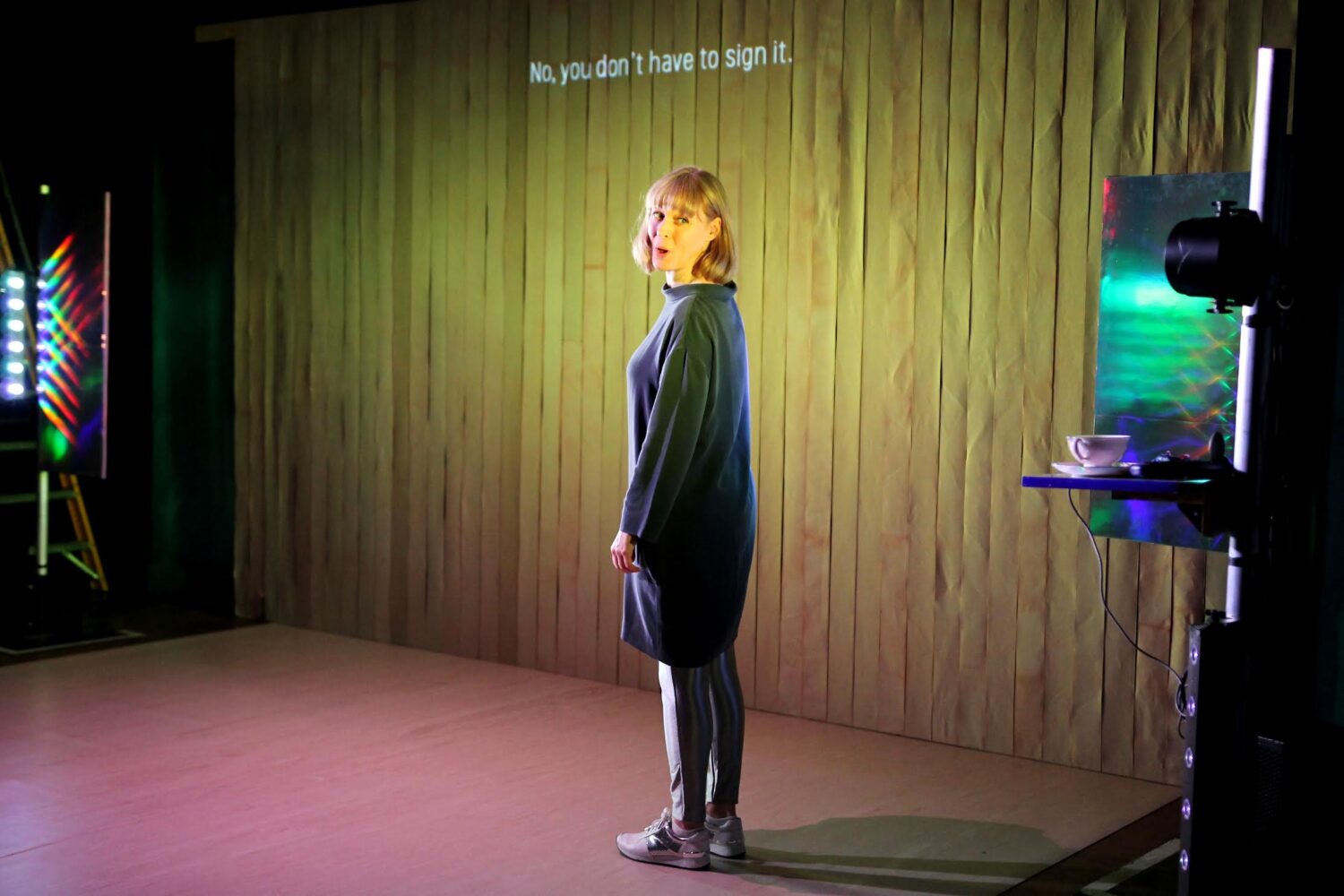
Augmented rehearsal shots, courtesy of Royal Exchange Theatre.
Woolley’s big break into theatre came in 2007 with her solo show When to Run. It was performed at Soho Theatre, the Edinburgh Fringe and did a UK tour. The show focussed on society’s impositions on women and how four females attempt to escape their personal lives through exercise, all portrayed through Woolley’s characteristic wit and incisive observations of modern life. “Things really took off for me then. It was around that time that I started using BSL interpreters in my rehearsals so I could follow speech.”
Woolley’s deafness is the result of hereditary progressive hearing loss. Growing up deaf as a teenager meant that Woolley was embedded in the D/deaf community from a young age. Now that she has a cochlear implant, some might think that her relationship to D/deaf culture has changed, but Woolley is passionate that she is still very much part of the community. “All deaf people are different and implantation is a new paradigm. I don’t think implants will cancel D/deaf people. I believe in the future hearing people will try to be more like deaf cyborgs. It’s all in the show. I don’t care if that sounds far fetched. My mum says I sign even better now.”
As a disabled artist with decades of experience and a kaleidoscopic career, Woolley is emphatic that early-career disabled artists should avoid the label ‘emerging artist’. “Your early years are just as interesting, influential, and important artistically as your mid and peak career,” says Woolley. “I was never called emerging, possibly because the category was not invented yet. In any case, I tried to be a star right away. I imagined filling stadiums when I started out. I rehearsed and rehearsed and wrote my heart out. I took creative risks. Try to crack the mainstream. There will be setbacks but it’s all swings and roundabouts. Use all the networks you can. You will face barriers and they will be very hard. Get organised. Get advice. Ask questions.”
Tour Dates
5-7th March 2020
Royal Exchange Theatre (Studio), Manchester
performance on 6th March is followed by a Q&A
Q&A is BSL interpreted by Siobhan Rocks plus live speech to text subtitles
9-11th March 2020
Birmingham Repertory Theatre (The Door)
performance on 11th March is followed by a Q&A
Q&A is BSL interpreted by Mary Connell plus live speech to text subtitles
12-14th March 2020
Salisbury Playhouse (Studio)
17-21st March 2020
Theatre Royal Plymouth (The Drum)
performance on 18th March is followed by a Q&A
Q&A is BSL interpreted by Daryl McMullan plus live speech to text subtitles
25th March 2020
Cambridge Junction (J2)
All performances of Sophie Woolley’s Augmented are captioned, audio described and relaxed.
Supported using public funding by the National Lottery through Arts Council England. The original R&D was funded in its development by Unlimited, celebrating the work of disabled artists, with funding from Arts Council England. Originally developed with Ovalhouse.
This post was written by the author in their personal capacity.The opinions expressed in this article are the author’s own and do not reflect the view of The Theatre Times, their staff or collaborators.
This post was written by Natasha Sutton Williams.
The views expressed here belong to the author and do not necessarily reflect our views and opinions.

